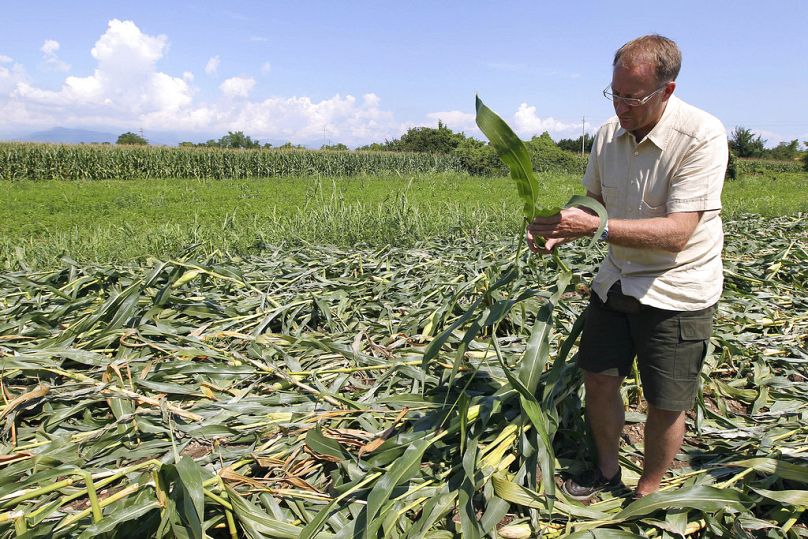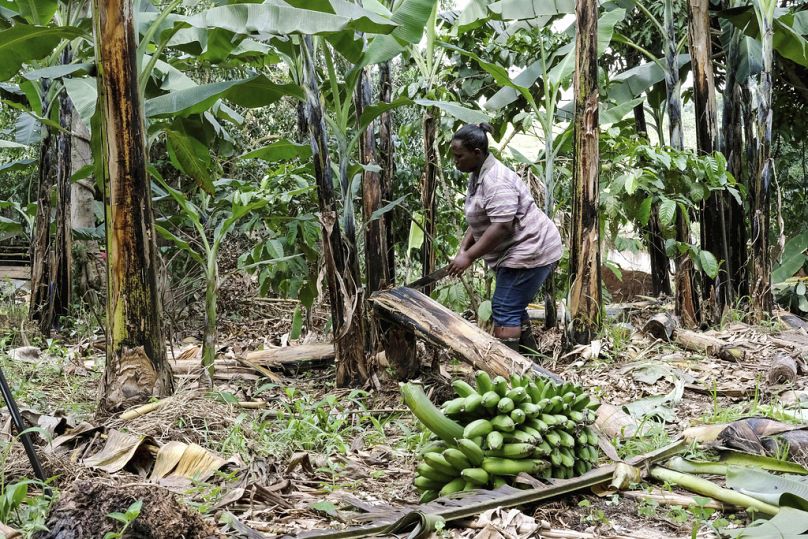NGTs give us a chance to hit the reset button — and embrace a technology that can make agriculture more climate-conscious, more sustainable, and more fruitful, Onyaole Patience Koku and Diana Lenzi write.
Nearly three dozen Nobel laureates have joined more than 1,000 scientists in urging members of the European Parliament to embrace science-based gene editing technology.
 ADVERTISEMENT
ADVERTISEMENT
 ADVERTISEMENT
ADVERTISEMENT
New genomic techniques (NGTs), they write in a petition, “hold immense promise for sustainable agriculture, enhanced food security, and innovative medical solutions.”
As farmers who worry about the future of food production in an era of climate change, we join this distinguished group in asking the policymakers of the EU to open their minds to the amazing potential of this technology.
On the surface, we don’t share much in common: One of us grows corn in Nigeria, and the other runs an organic vineyard and olive grove in Italy. We live in different places, serve different customers, and face different challenges.
Yet we’re united in our belief that NGTs present a tremendous opportunity to farmers in Africa, Europe, and everywhere as we strive to grow more food in a more sustainable way.
We can't afford a repeat of GMO rejection
The EU’s proposal of regulation on NGTs, as much as it is a welcomed step forward into understanding and accepting the great benefits that agriculture and civil society could both obtain thanks to the introduction of NGT technology in plant breeding, is a confusing mess with some grey areas that might undermine the efficiency of the new regulation.
While many European farmers, stakeholders, and NGOs are attracted to this important innovation and recognize its enormous upside, others remain sceptical.
The stakes are huge. In a global market, the failure to introduce NGTs in Europe will hurt not only European farmers who strive to do more with less and improve their commitment to sustainability but also inadvertently impact African farmers who depend on trade with Europe.
In their petition, the scientists put the matter bluntly, imploring the Europeans “to engage with the overwhelming majority of farmers and genuine experts, not with reactive anti-science lobbyists in the Brussels bubble.”
What we absolutely cannot afford is a repeat of Europe’s disastrous rejection of GMOs, a safe technology that has transformed agriculture in the Americas and much of Asia, where they’ve allowed farmers to grow more staple foods, fight pests and disease, and build climate resilience into their crops.
NGTs, however, offer a remarkable science-based opportunity to move past this old dispute.
Technology that can involve everyone
With NGTs, crop scientists can speed up the slow process of traditional breeding that farmers have used since the birth of agriculture in the distant past. They get results quickly by nudging existing genes in helpful directions, leapfrogging the antiquated trial-and-error experiments that can take generations to complete.
NGTs can help farmers fight climate change by equipping crops to withstand the extremes of heat and cold as well as droughts, floods, and disease. They can help us reduce our reliance on herbicides and pesticides. And they can help us improve our yields and feed a growing planet.
This technology also can involve everyone, from big-time producers of major commodities to farmers like us.
In Italy, NGTs could help farmers overcome the devastating effects of climate change and the spread of uncontrollable pests and fungi that the traditional methods of control and contrast can no longer defeat.
And they can make it easier for organic farmers to produce affordable food and compete in the marketplace while remaining true to their core principles.
In Africa, where agricultural productivity trails the rest of the world, NGTs can help farmers grow better crops that make more food, nourish our neighbours, and push us toward economic self-sufficiency. NGTs also will lead to a new round of astonishing medical breakthroughs.
None of this will happen without Europe’s political and scientific leadership.
A chance to hit the reset button
In recent months, various bodies within the EU’s political bureaucracy have considered the promise of NGTs, but their deliberations mostly have delivered uncertainty.
In 2024, they must strive to come up with a consistent and evidence-based approach that begins to settle the matter in favour of this excellent technology.
But it is now also the time for national governments to show their support for this regulation.
The proposal now sits in the hands of the Council and it will be there for the support or rejection of the leaders of Europe that will determine if we wish for science to be the guiding light for Europe’s transition to more sustainable food systems.
The policies of the EU determine the rules that govern its member countries, of course, but their influence reaches far beyond their borders.
When the EU resisted GMOs around the turn of the century, much of the developing world followed its example — and then watched with envy as farmers in the United States, Canada, Argentina, and Brazil adopted biotechnology and surged ahead with the biggest yields agriculture has ever seen.
NGTs give us a chance to hit the reset button — and embrace a technology that can make agriculture more climate-conscious, more sustainable, and more fruitful.
Onyaole Patience Koku co-founded and manages Replenish Farms in Nigeria. Diana Lenzi runs her family’s organic winery, Fattoria di Petrorio, in Tuscany, growing grapes for Chianti Classico and olives for extra virgin olive oil.
At Euronews, we believe all views matter. Contact us at view@euronews.com to send pitches or submissions and be part of the conversation.












